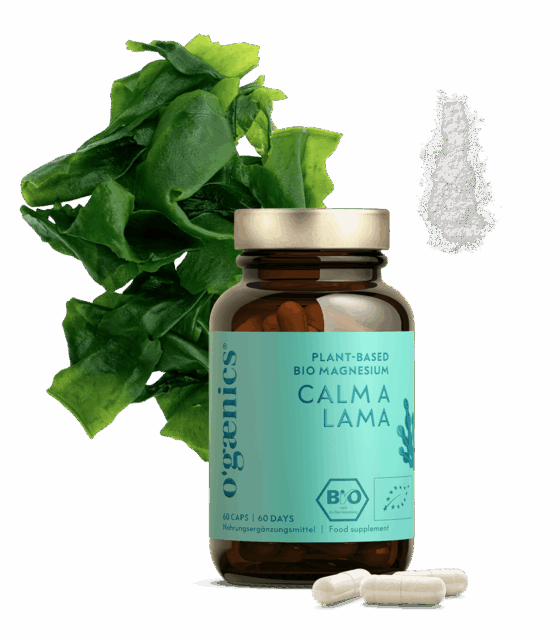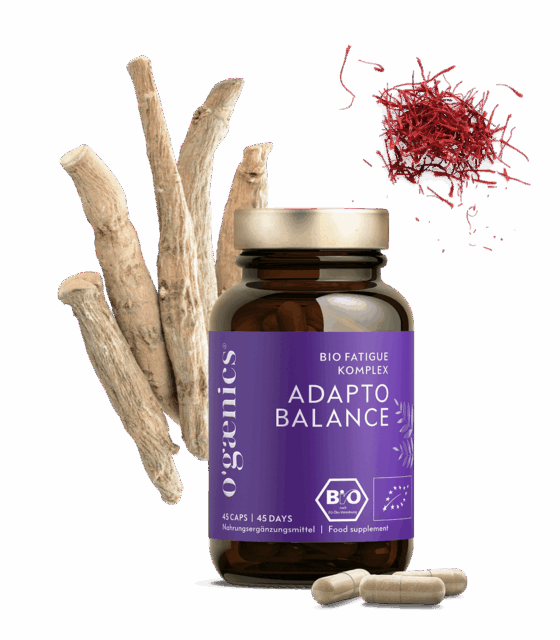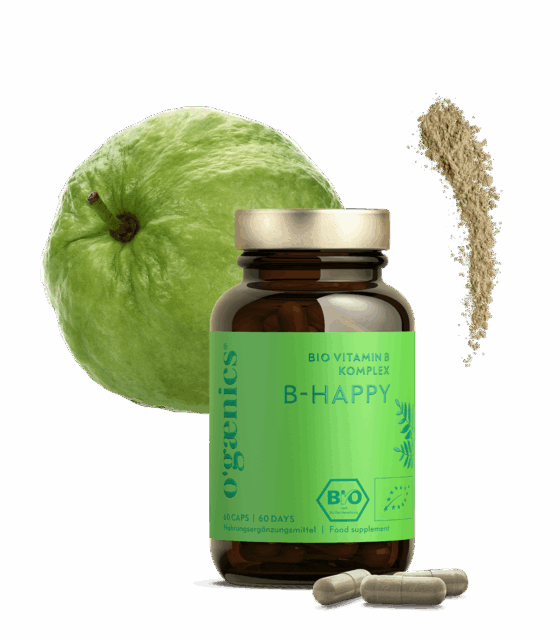IN THIS ARTICLE
Stress is so Last Year, isn’t it? We reveal which vitamins and minerals help against stress.
Good and bad stress
In some situations, stress can be your best friend because it allows you to move forward. Without this reaction, our ancestors would never have left their caves! It gives us adrenaline. The energy we need to avoid danger, pass a test, overcome a sporting challenge, overcome fears. And all this regardless of age or gender!
However, depending on your emotional state, certain situations can create a type of stress that is more damaging and difficult to manage. For example, a difficult situation at work, a breakup, general burnout symptoms, or difficulty quitting smoking.
Symptoms such as insomnia, stomach aches and headaches, fatigue, irritability, shortness of breath, sweating can then occur as well as low stamina, increased snacking, difficulty concentrating or memory problems. Then it’s time to react and do something, as these symptoms pose a significant risk to your health in the long run (e.g., it can result in high blood pressure, depression, anxiety, or illness). So stress management is the name of the game!
Dealing with stress in everyday life
Living in the present is the best way to deal with stress. A 2012 study conducted at Virginia Commonwealth University in the United States showed that a person’s ability to focus on the present is associated with lower levels of stress hormones (adrenaline and cortisol). The simple act of consciously fixating on specific details and continuously working on things that are not in the here and now feeds your anxiety. This can increase the risk of releasing more stress hormones. So don’t do that!
Discover effective ways to reduce your cortisol levels in our article “Reducing cortisol: how to beat stress and fatigue”.
But even if we try to live in the here and now, we can still experience permanent stress. Z. For example, when we rush every day between work, shopping, children and our personal lives. Likewise when the employer constantly puts us under pressure. Then it’s time to break the negative cycle.
Signs of permanent stress:
- not being able to sleep or relax before an important meeting
- tend to be impatient
- feel easily irritated by children’s noise
- very to be nervous
- Having tension in the upper back all the time
- sometimes forget meetings or work due to lack of concentration…
With such signs of prolonged stress, the body constantly produces too much energy – and that can make us sick in the long run. The best solution is to react immediately by breaking this cycle at the first symptoms and starting a stress management program, including nutrition.
The best vitamins (and minerals) against stress
During stress, the body and the circulatory system work at full speed: more energy, oxygen and also more metabolic co-factors are needed, such as vitamins and minerals. The irony of stress, after all, is that we need more nutrients under stress than we normally would, yet it is at such times that we tend to reach for foods that contain few nutrients – mostly “comfort foods” like sweets, chocolate, and other snacks made from short-chain carbohydrates.
To come down from the stress level should pay special attention to the following nutrients:
Antioxidants for stress
Antioxidant supplements generally do not improve the health of people who are already healthy (here they assist in protecting against free radicals). But under conditions of chronic stress, antioxidants have been found to be particularly important in studies:
One study found that vitamin C (both antioxidants) reduced liver damage from mental stress. Another study showed that vitamin C helped reduce anxiety symptoms in students.
In our Ogaenics Body Guard Immunity Complex you will find vitamin C and other antioxidants. This product accompanies you through stressful times with natural vitamin C, zinc, maitake and other superfoods in organic quality.
-
Bestseller
Body Guard
30-day cure Bio Immunity Complex with vitamin C, D, zinc, organic echinacea, elderberry and ginger39,90 €1.995,00 € / kg
Magnesium for stress
Magnesium is not a vitamin, but it is an important mineral for stress. Certain physical stress symptoms such as anxiety, nervousness and muscle tension, for example, can be well managed with magnesium. Because whenever the stress hormones adrenaline and cortisol are released, the body also releases magnesium. This is then excreted and is no longer available to the body for numerous vital metabolic processes and reactions.
If the body lacks sufficient magnesium as a result, the heart can no longer beat rhythmically and muscles can no longer contract and relax. Correct transmission of nerve stimuli is also not ensured. Brain functions such as concentration, learning, memory and thinking then no longer function properly. In addition, the structure of bone and teeth is weakened. Ultimately, magnesium deficiency also leads to lower energy production in cells and hinders healthy cell division.
That’s why it makes sense to consume more magnesium during more stressful times and supplement with a natural magnesium like Calm A LamaPlant-Based Magn esium in organic quality when needed.
-
Bestseller
Calm A Lama
60-day supply of plant-based organic magnesium from premium organic green algae extract for muscles and nerves44,90 €1.076,74 € / kg
B vitamins for stress
In a study a vitamin B complex was found to be particularly effective in people who had to cope with stress after an external disaster (in this case, a flood). This was a follow-up study to a previous study in New Zealand after an earthquake.
The study found that people who took a B-complex were better able to cope with shock and had fewer post-traumatic stress symptoms afterwards. This effect can be attributed to the fact that B vitamins are used in the metabolic reactions that go into high gear during stress.
However, high doses of B vitamins also help with stress at work, as this study found. A high-quality natural B complex such as B-Happy in organic quality or the Adapto Balance Fatigue Complex provides you with an optimal supply of B vitamins in stressful times.
You can find out exactly how B vitamins can help with stress in the article “Why B vitamins help with stress”.
-
Adapto Balance
6-week supply for psyche, nerves and energy with Safr'inside™, organic KSM-66® Ashwagandha and an organic vitamin B complex49,90 €1.386,11 € / kg
Probiotics for stress
Stress also poses a threat to gut health. It has a negative influence on the intestinal flora and leads to an increase in intestinal permeability (“leaky gut”). Because the gut is also the organ that absorbs nutrients, intestinal problems can often lead to downstream difficulties in nutrient absorption.
If you want to understand even more deeply how exactly stress affects your gut, why your gut often sends the first warning signal – and how you can specifically restore balance – read our article 👉 What stress really does to your gut – and how you can counteract it
You can eat the same amount of nutrients as you always have, and that amount might be perfectly adequate, but if they are not absorbed, your body will not be supplied with enough nutrients. For this reason, it is important to support the gut even during stressful times by taking a high-quality daily probiotic. The Love Your Gut Daily Biotic complex offers a good option here.
-
Bestseller
Love Your Gut
Bio Daily Biotic Complex Premium for the gut: 21 bacterial strains plus organic fiberab 39,90 €2.660,00 € / kg















 No products in the cart.
No products in the cart.